- Home
- Rosamunde Pilcher
The End of Summer Page 7
The End of Summer Read online
Page 7
“And the birds?”
“Aye, there are ony number of birds. Mind, I got a couple of vixen and their cubs during the spring.”
“What about cows?”
“I’ve kept them awa’. And the heather’s great, it was well burnt at the beginning of the season.…”
“You’re not finding it too much for you?”
“Och, I’m fit enough yet.”
“My grandmother said you had a week or two in bed last winter.”
“That was just a touch of the flu. The doctor gave me a bottle and I was richt as rain … you don’t need to listen to what the women say.…”
Mrs Gibson, returning with the photographs, picked this up.
“What’s that about women?”
“You’re just a lot of auld hens,” her husband told her. “Fussing over a wee bit flu…”
“Ach, it wisna so wee … and whit a time I had to keep him in bed,” she added for Sinclair’s benefit. She handed the photographs over for me to study, and warmed to the subject. “And I’m not so sure it was just flu … I wanted him to have an X-ray, but he wouldn’t hear of it.”
“You should, Gibson.”
“Ach, I havna’ time to be going to Inverness for all that caper…” and, as if bored by the subject of his health and wishing to change the subject, he shifted his chair in my direction in order to peer over my shoulder at the photographs of his sons; Hamish, a solid looking corporal in the Camerons, and George, formally posed in a photographer’s salon. “Geordie’s at the University, did Mrs Gibson tell you? In his third year now, and he’ll end up a lawyer. Do you mind the time he helped you build yon tree house?”
“It’s still standing, too. It hasn’t blown down yet.”
“Onything Geordie did, he always did well. He’s a great lad.”
We stayed to gossip a little longer, and then Sinclair pushed back his chair and said that it was time to go. The Gibsons came out to see us off, and the dogs, hearing voices again, started up their barking, so we all went over to the kennels to talk to them. There were two, both bitches, one black and the other gold. The one had a soft, creamy coat, and an endearing expression, with dark tip-tilted eyes.
I said, “She looks like Sophia Loren.”
“Oh, aye,” said Gibson. “She’s bonnie. She’s on season just now, so I’m taking her over to Braemar tomorrow. There’s a man there with a good dog. I thought maybe we’d see if we could get a litter of pups.”
Sinclair raised his eyebrows. “You’re going tomorrow? What time?”
“I’ll be leaving around the back end of nine.”
“What’s the weather forecast? What sort of a day is it going to be?”
“We should have a bit of a wind tonight, blow all this murk away. It’s a good forecast for the weekend.”
Sinclair turned to smile at me. “What do you say?”
I had been playing with the dog and scarcely listening to all this. “Uh?”
“Gibson’s going to Braemar tomorrow morning. We could get a lift, walk back home through the Lairig Ghru…” He turned back to Gibson. “Could you get up to Rothiemurchus in the evening and meet us?”
“Oh aye, I could do that. About what time would that be?”
Sinclair considered. “About six? We should be in by then.” He looked at me again. “What do you say, Jane?”
I had never walked the Lairig Ghru. In the old days, every summer, it had been done by someone from Elvie, and I always longed to go, but was never included in the party because my legs were not considered sufficiently long. But now …
I looked up at the sky. The cloud of the morning had never cleared and was now turning, as the day died, to a fine mist. “Is it really going to be a good day?”
“Oh, aye, and verra warm.”
Gibson’s opinion was enough. “I’d like to do it. More than anything.”
“Well that’s settled. Nine o’clock at the house then?”
“I’ll be there,” promised Gibson, and we thanked them for the tea and left them, walking down the hill and across the wet road, and so to Elvie. The dank air hung with moisture and beneath the copper beeches it was very dark. I was suddenly depressed. I had wanted nothing to change … had wanted Elvie to be exactly as I remembered it, but seeing Gibson, so aged, had brought me up with a jolt. He had been ill, he said. One day he would die. And the thought of death, in that chill, in-between hour, made me shiver.
Sinclair said, “Cold?”
“I’m all right. It’s been a long day.”
“Are you sure you want to go tomorrow? It’s a hell of a walk.”
“Yes, of course.” I yawned. “We’ll have to get Mrs Lumley to give us a picnic.”
We came out from under the beeches and the forbidding north aspect of the house reared before us, silhouetted against the lowering sky. A single light burned, shining yellow across the blue dusk. And I decided that before dinner I would have a hot bath, and then I would not feel cold and depressed any longer.
6
I was right. Lapped in silky Scottish water, I dozed. It was still early, so I found a hot water bottle in the bathroom cupboard and filled it from the tap and went to bed for an hour, lying in the darkness with the curtains undrawn and listening to the endless honking and gabbling of the wild geese.
After this, I dressed again, and with a vague idea of making my first night home something of an occasion, took trouble to pile up my hair and to use every sort of artifice on my eyes. Then I took down my only formal garment, a gold-and-black caftan in heavy silk, all embroidered and frogged in gold, which my father had found in an obscure Chinese shop in a back street of San Francisco and had been unable to resist.
It made me look very regal. I fixed on my earrings, splashed some scent around and went downstairs. I was early, but I wanted to be early. As I lay in bed, I had made a small plan and wanted the place to myself.
My grandmother’s drawing-room, made ready for the evening, had an impact as visually charming as a stage set. The velvet curtains had been closed against the darkness, the cushions plumped, magazines straightened, and the fire made up. The room was softly lit by a pair of lamps, and flamelight was reflected in brass fender and coal shuttle, and from lovingly polished wooden surfaces all over the room. There were flowers everywhere, and boxes filled with cigarettes, and the small table which did duty as a bar was neatly lined up with bottles and glasses, an ice bucket and a small dish of nuts.
Over on the other side of the room, flanking the fireplace, was a highly decorated bombé cabinet, with glassfronted bookshelves on top, and three deep, heavy drawers beneath. I went over to this, and pushing a small table out of the way, knelt to open the bottom drawer. One of the handles had broken and the drawer was very heavy, and I was struggling with it when I heard the door open again and someone came in. Feeling foiled, I swore to myself, but there wasn’t time to get to my feet before a voice said, from just behind me, “Good evening.”
It was David Stewart. I looked up over my shoulder, and found him standing over me, looking unexpectedly romantic in a dark blue dinner jacket.
I was too surprised to be polite. “I’d completely forgotten you were coming for dinner.”
“I’m afraid I’m a little early. There didn’t seem to be anyone around, so I let myself in. What are you doing? Looking for an earring, or playing bears?”
“Neither. I’m trying to get this drawer open.”
“What for?”
“It used to be full of photograph albums. Judging from the weight, I should guess it still is.”
“Let me have a go.”
I moved obediently aside, and watched while he doubled up on his long legs, took hold of the two handles, and gently eased the drawer open.
“It looks so easy,” I said, “when someone else does it.”
“Are these what you are looking for?”
“That’s right.” There were three of them, old, bulging albums, weighing a ton.
“Did you i
ntend indulging in a long, nostalgic session? With this lot it should take you the rest of the evening.”
“No, of course not. But I want to find a picture of Sinclair’s father … I thought perhaps there’d be a wedding group.”
There was a small silence. Then, “Why this sudden desire to find a photograph of Aylwyn Bailey?”
“Well, it seems ridiculous, but I’ve never seen one. I mean, Grandmother never had any standing around. I don’t think there’s even one in her room … I don’t remember it. It’s funny, isn’t it?”
“Not necessarily. Not when you know her.”
I decided to take him into my confidence. “We were talking about him today. She said that he looked like Sinclair, and that he was very charming. She said that he only had to walk into a room for all the women to start falling about in heaps. I never paid him much heed when I was little … he was simply Sinclair’s father-in-Canada. But … I don’t know … I suddenly got all curious.”
I lifted out the first book, and opened it, but it was dated only ten years ago, so I went down to the bottom of the drawer, and took out the last one. It was a handsome album, bound in leather, and all the photographs—faded now and inclined to be sepia coloured—had been entered with geometrical precision and labelled in white ink.
I leafed through the pages. Shooting parties and picnics, and groups, and studio portraits, complete with painted backdrops and potted palms. A girl in presentation feathers, and a black-stockinged child (my mother) dressed as a gipsy.
And then a wedding group. “This is it.” My grandmother, stately in what looked like a velvet turban and a very long dress. My mother, smiling gaily as though determined to look as though she were enjoying herself. My father, young and slim, clean shaven and wearing his suffering expression. Probably his collar was too tight. An unknown child being a bridesmaid, and finally, the bride and groom. Silvia and Aylwyn, their young faces round and curiously untouched by any sort of experience. Silvia with a little, painted, dark-red mouth and Aylwyn smiling in a private way at the camera, his tip-tilted eyes suggesting that the whole business was the most enchanting joke.
“Well?” said David at last.
“Grandmother was right … he’s exactly like Sinclair … it’s just that his hair’s shorter and cut differently, and perhaps he’s not quite so tall. And Silvia—” I didn’t like Silvia— “Silvia left him after they’d only been married about a year. Did you know that?”
“Yes, I knew.”
“That’s why Sinclair was always at Elvie. What are you doing?”
He was feeling around in the back of the drawer. “Here are some more,” he said, and brought out a pile of heavily mounted photographs which had been put away at the back and out of sight.
“What are they?” I laid down the book I had been holding.
He turned them over in his hand. “Yet another wedding. At a guess, I’d say your grandmother’s.”
Aylwyn was forgotten. “Oh, let me see.”
We were back now into the years of the First World War, hobble skirts and enormous hats. The group was posed around on chairs, like Royalty; high collars and cut-away coats, and expressions on faces of enormous solemnity. My grandmother as a young bride was large-bosomed, and draped in lace, her new husband scarcely older than she was, with that same amused, merry expression which even his sombre clothes and considerable moustache could do nothing to quench.
I said, “Here, he looks gay.”
“I think he probably was.”
“And who’s this? The old fellow in whiskers and a kilt?”
David looked over my shoulder. “Probably the bridegroom’s father. Isn’t he splendid?”
“Who was he?”
“I believe a great character—called himself Bailey of Cairneyhall—they were an old family around here, and legend has it that he used to give himself tremendous airs and graces, despite the fact that he didn’t have a ha’penny to bless himself with.”
“And my grandmother’s father?”
“That impressive looking gentleman, I imagine. Now, he was a very different kettle of fish. A stockbroker in Edinburgh. He made a lot of money and died a rich man. And your grandmother,” he added in lawyer-like tones, “was his only child.”
“You mean … she was an heiress.”
“You could say that.”
I looked at the picture again, the solemn, unfamiliar faces who were my ancestors, the people who had made me, with all my faults and my small talents, and had given me my face and my freckles, and my fair Nordic hair.
“I never even heard of Cairneyhall.”
“You wouldn’t. It became so derelict and ramshackle it eventually had to be pulled down.”
“So my grandmother never lived there?”
“I think for a year or two she did, probably in the greatest possible discomfort. But when her husband died, she moved to this part of the world, bought Elvie, and brought her children up here.”
“So…” I stopped. I realized that, without ever having thought very much about it, I had always taken it for granted that my grandmother was if not exactly “richly left,” then certainly well provided for. But it seemed now that this was not so. Elvie, and everything in it, had come from her own inheritance, belonged solely to her. And it had no connection whatsoever with her marriage to Aylwyn’s father.
David was watching me. “So?” he prompted gently.
“Nothing.” I was embarrassed. The whole question of money makes me feel uncomfortable, a trait I have inherited from my father, and I hastily changed the subject. “How do you know so much about them all, anyway?”
“Because I look after the family affairs.”
“I see.”
He closed the photograph album. “Perhaps we’d better put them all away…”
“Yes, of course. And, David … I don’t want Grandmother to know I’ve been asking all these questions.”
“I won’t say a word.”
We put the books and the photographs back where we had found them, and closed the drawer. I moved the table back into its place, then went to take the guard from in front of the fire, and find a cigarette, and light it with a spill. As I straightened, I found David watching me. He said, out of the blue, “You’re looking very beautiful. Scotland obviously agrees with you.”
I said, “Thank you,” which is what nicely raised American girls are taught to say when paid a compliment. (English girls say things like, “Oh, I don’t, I look a mess”, or “How can you say you like this dress? It’s ghastly”, which I am assured can be very off-putting.)
And then, because I felt suddenly shy and needed a diversion, I suggested that I should fix him a drink, and he said that in Scotland one didn’t fix drinks, one poured them.
“Not martinis,” I insisted. “You can’t pour a martini until you’ve fixed it. It stands to reason.”
“You have a point. Do you want a martini?”
I was doubtful. “Do you know how to make one?”
“I like to think so.”
“My father says only two men in Britain can make a martini, and he’s one of them.”
“Then I must be the other.” He went over to the table and busied himself amongst the bottles and ice and twists of lemon peel. He said, “What have you been doing today?”
I told him, right up to the hot bath and the session on my bed, and then I said, “And tomorrow you couldn’t guess what we’ve planned.”
“No, I couldn’t. Tell me.”
“Sinclair and I are going to walk the Lairig Ghru.”
He was gratifyingly impressed. “Are you really? ”
“Yes, really. Gibson’s going to drive us over to Braemar and then meet us at Rothiemurchus in the evening.”
“What sort of day is it going to be?”
“Gibson says fine. He says all this murk’s going to blow away and it’ll be ‘verra hot’.” I watched him, liking his brown hands, and his dark neat head, and the wide shoulders beneath the soft blue v
elvet. I said, on an impulse, “You should come too…”
He came across the room, carrying the two pale golden, icy drinks. “I’d like to more than anything, but I’m busy all day tomorrow.”
I took the glass and said, “Perhaps another time.”
“Yes, perhaps.”
We smiled, raised glasses, drank. The martini was delicious, cold and heady as fire. I said, “I’ll write and tell my father I’ve met the other martini-mixer,” and then I remembered something. “David, I simply have to get some clothes…”
He took the abrupt change of subject in his stride. “What sort of clothes?”
“Scottish clothes, sweaters and things. I’ve got that money my father gave me, but it’s all in dollar bills. Do you think you could get them changed for me?”
“Yes, of course, but where do you intend doing your shopping? Caple Bridge isn’t exactly the fashion centre of the north.”
“I don’t want anything fashionable, I just want something warm.”
“In that case I suppose it would be all right. When do you want to do this shopping?”
“Saturday?”
“Can you drive your grandmother’s car?”
“I can drive it, but I’m not allowed to. I haven’t got a British licence … but it doesn’t matter, I’ll catch the bus…”
“All right. Then come to the office—I’ll tell you how to find it—and I’ll give you your money, and then when you’ve fixed yourself up with woollies, and if you haven’t anything better to do, I’ll give you lunch.”
“Will you?” I had not expected this, and I was delighted. “Where?”
He scratched thoughtfully at the back of his neck. “There’s not really much choice. Either the Crimond Arms, or my house, and my housekeeper doesn’t come in on a Saturday.”
I said, “I can cook. You buy something and I’ll cook it. Anyway, I’d like to see where you live.”
“It’s not very exciting.”
But I found that I was mildly excited, all the same. I have always thought that you don’t know a man until you have seen his home, his books, his pictures, the way he fixes his furniture. David, all that time in California, and while we were travelling home together, had been sweet and kind, but had shown me only the correct and businesslike side of his character. But now he had helped me find the photograph I wanted, and answered, with great patience, all my questions, and finally asked me out to lunch. I realized that there was a great deal more to him than I had first thought, and it was enormously gratifying to imagine that perhaps he felt the same way about me.

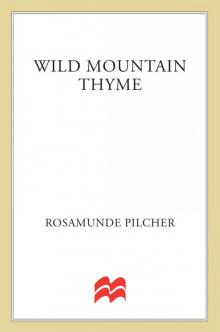 Wild Mountain Thyme
Wild Mountain Thyme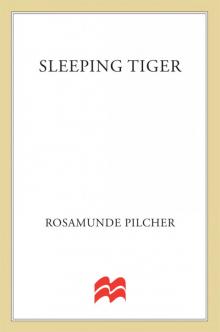 Sleeping Tiger
Sleeping Tiger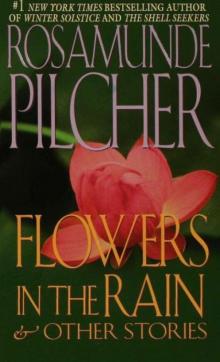 Flowers in the Rain & Other Stories
Flowers in the Rain & Other Stories September
September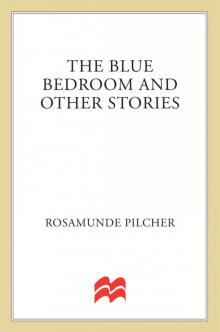 The Blue Bedroom: & Other Stories
The Blue Bedroom: & Other Stories The Carousel
The Carousel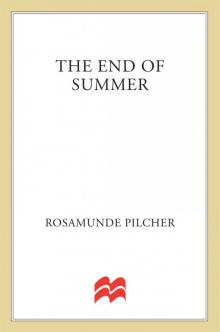 The End of Summer
The End of Summer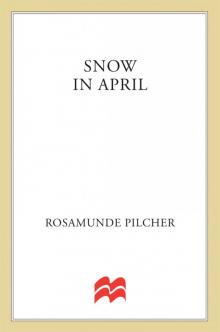 Snow in April
Snow in April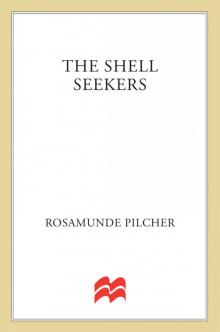 The Shell Seekers
The Shell Seekers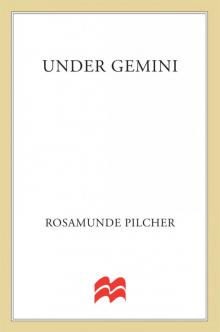 Under Gemini
Under Gemini The Empty House
The Empty House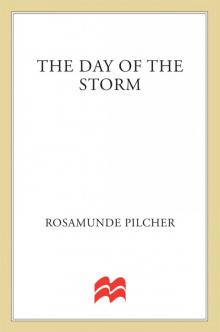 The Day of the Storm
The Day of the Storm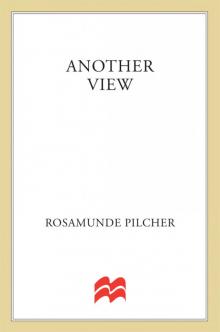 Another View
Another View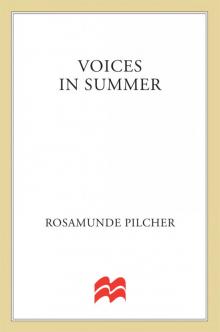 Voices in the Summer
Voices in the Summer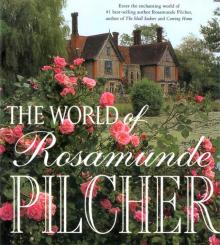 The World of Rosamunde Pilcher
The World of Rosamunde Pilcher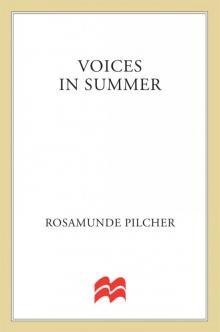 Voices In Summer
Voices In Summer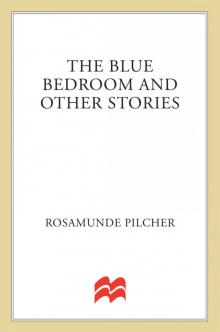 Blue Bedroom and Other Stories
Blue Bedroom and Other Stories